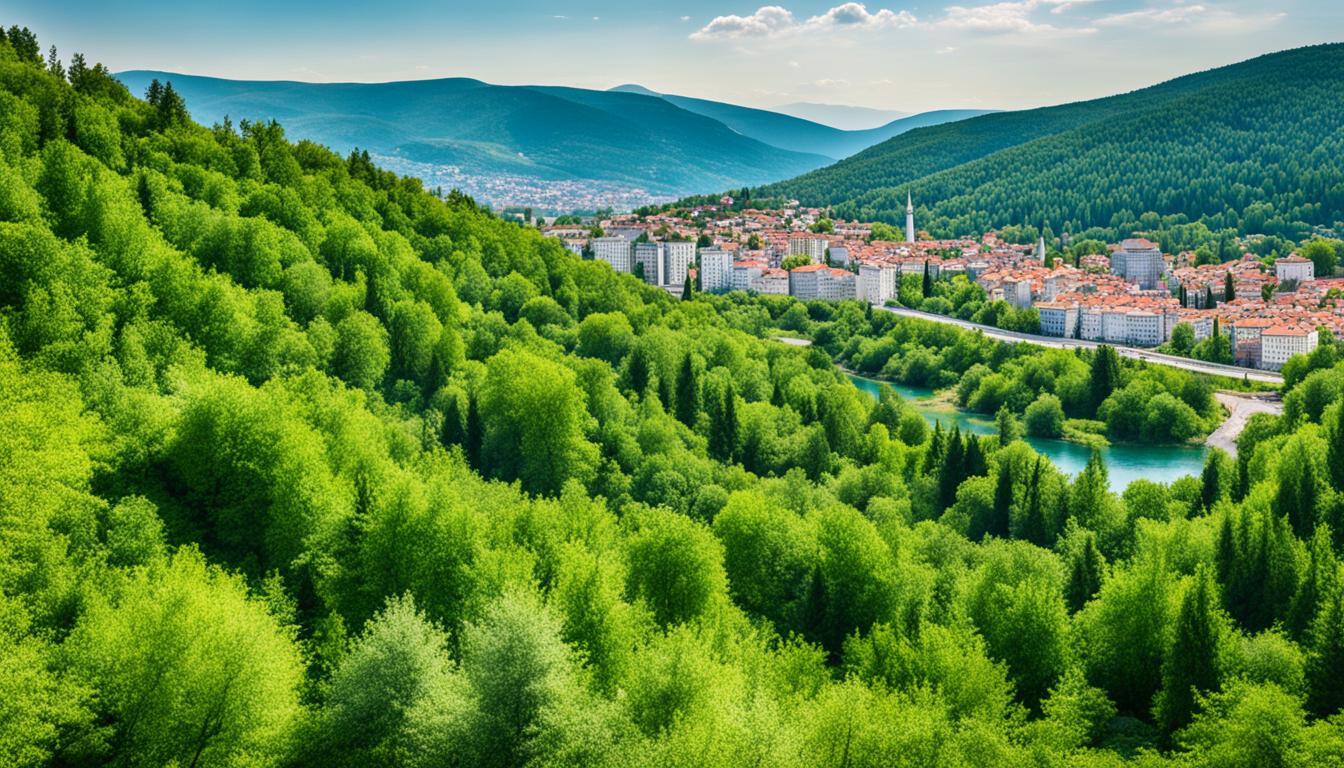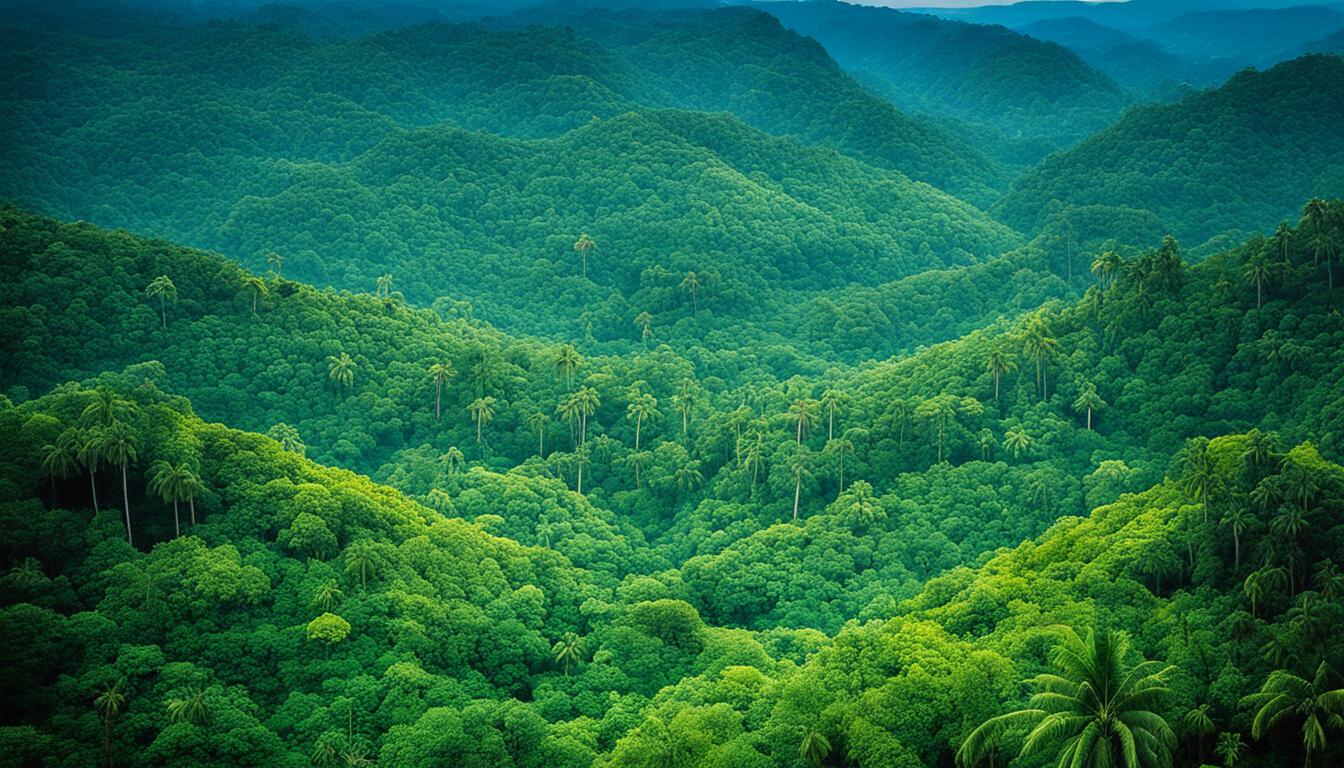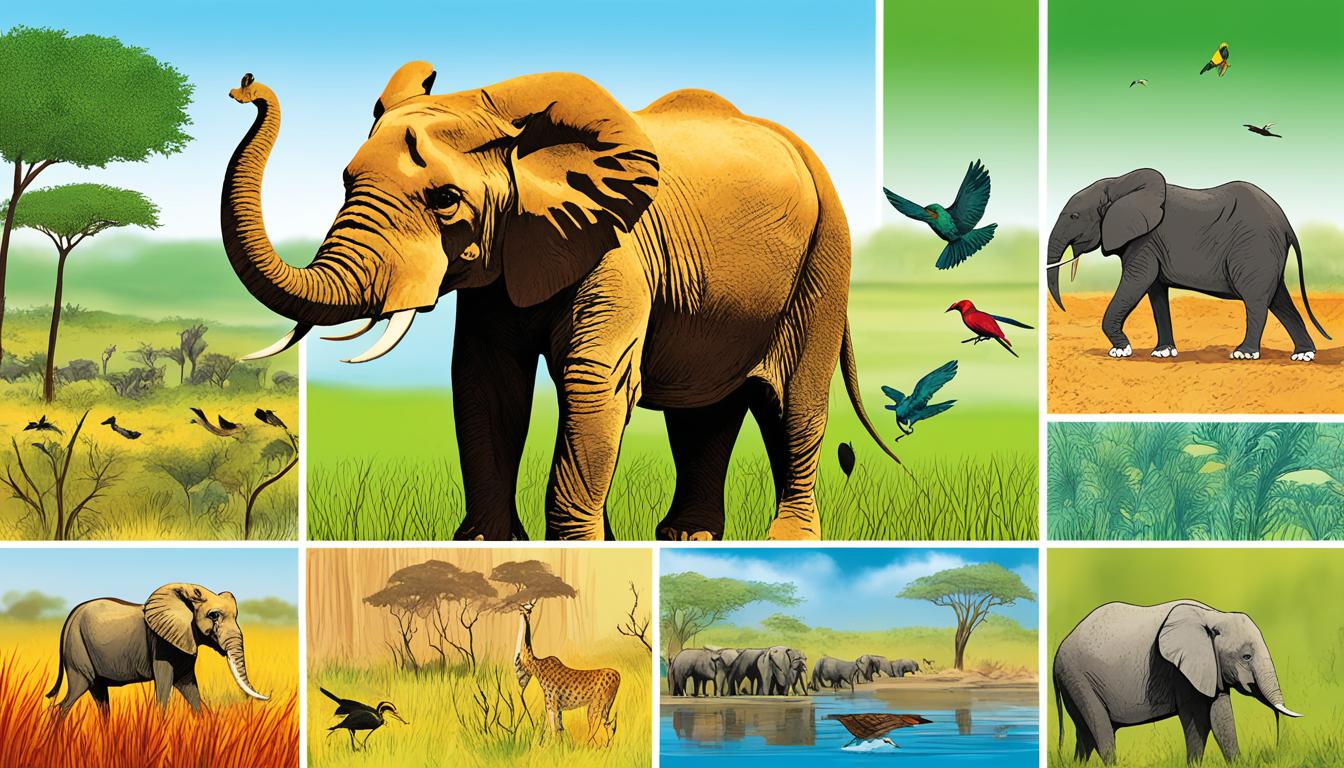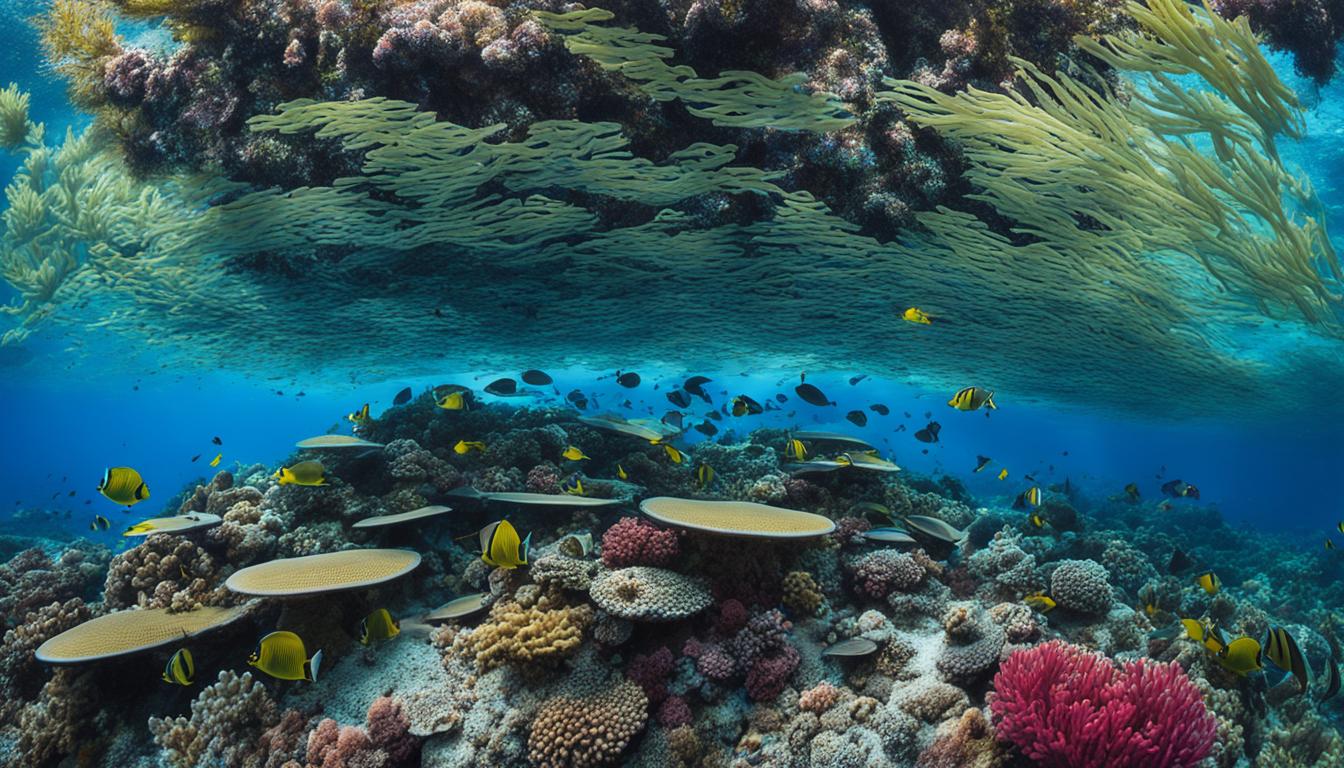Botswana Biodiversity and the Built Environment
Welcome to our exploration of Botswana’s remarkable biodiversity and its interaction with the built environment. Botswana is renowned for its diverse ecosystems and rich biodiversity, making it a captivating destination for nature enthusiasts and wildlife lovers. From the iconic Okavango Delta to the unique plant and animal species found throughout the country, Botswana showcases the beauty and importance of biodiversity.
Key Takeaways
- Botswana is known for its diverse ecosystems and rich biodiversity.
- The country has seven distinct eco-regions, two of which are classified as Global 200 eco-regions of conservation priority.
- Threats to Botswana’s biodiversity include habitat reduction, climate change, poaching, and unregulated tourism.
- Botswana has established protected areas, such as the Okavango Delta and Chobe National Park, to safeguard its diverse species.
- Sustainable urban development and environmental stewardship play critical roles in ensuring the coexistence of biodiversity and the built environment.
Exploring the Flora and Fauna of Botswana
The flora and fauna of Botswana offer a fascinating glimpse into the country’s immense biodiversity. From the vast grasslands of the Kalahari Desert to the lush wetlands of the Okavango Delta, Botswana’s ecosystems are home to numerous unique and endemic plant and animal species.
The resilient plants, such as the camel thorn tree and mopane tree, dominate the landscape and provide sustenance and shelter to a diverse range of wildlife, including elephants, giraffes, and various bird species. The country’s fauna is equally diverse, with iconic African animals such as lions, leopards, cheetahs, and zebras roaming freely in protected areas.
Birdwatchers will be delighted by the abundance of bird species, including the majestic African fish eagle and the vibrant lilac-breasted roller.
Unique Plant and Animal Species in Botswana
| Plant Species | Animal Species |
|---|---|
| Camel Thorn Tree | Lion |
| Mopane Tree | Leopard |
| Okavango Reed | Cheetah |
| Wild Watermelon | Zebra |
“The flora and fauna of Botswana captivate visitors with their incredible diversity. From the resilient plants that dominate the landscape to the iconic African animals that roam freely in protected areas, there is so much to explore and experience in this biodiverse country.”
Wildlife Conservation and Protected Areas in Botswana
Botswana places a high emphasis on wildlife conservation and has established numerous protected areas to safeguard its diverse species. These protected areas serve as crucial habitats for a wide array of animal and plant species, allowing them to thrive and ensuring their long-term survival.
Okavango Delta: A Biodiverse Wonderland
The Okavango Delta, a UNESCO World Heritage Site, is one of Botswana’s most treasured protected areas. This unique wetland oasis is a haven for an extraordinary variety of wildlife, including elephants, lions, and over 400 species of birds. Its intricate network of channels, islands, and lagoons provides a sanctuary for these species to thrive.
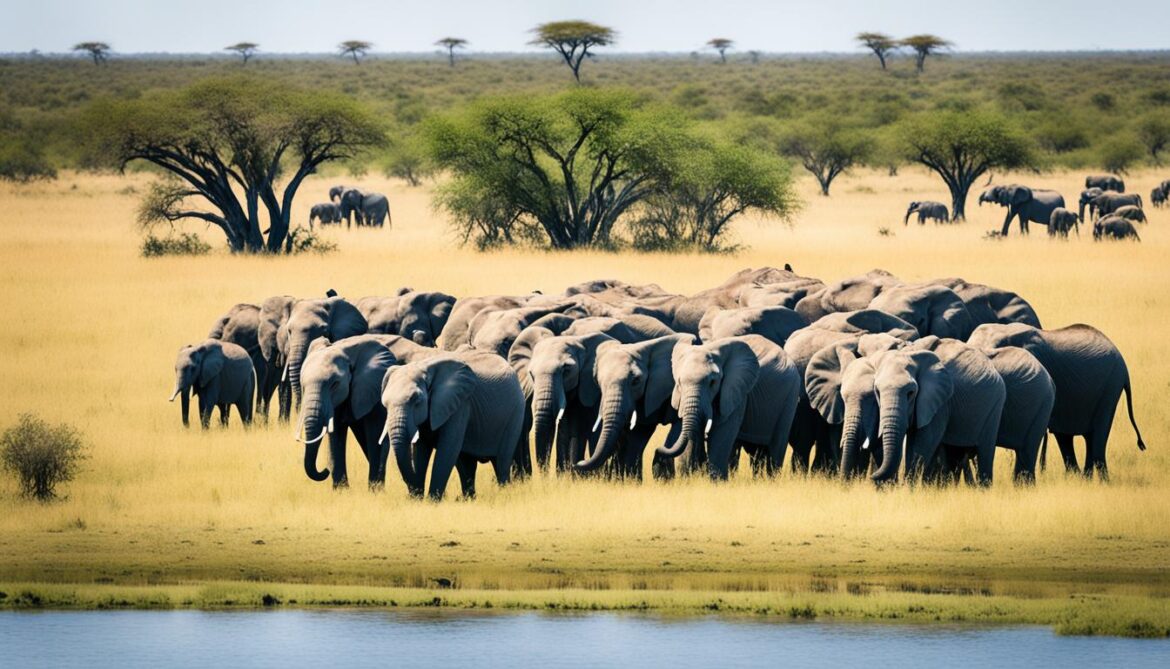
Chobe National Park: A Haven for Elephants and More
Another significant protected area in Botswana is Chobe National Park. Known for its large herds of elephants and buffalo, this park offers visitors a chance to witness the mesmerizing sight of these majestic creatures in their natural habitat. Lion, leopard, and a diverse range of bird species also call Chobe National Park their home.
Other Notable Protected Areas in Botswana
In addition to the Okavango Delta and Chobe National Park, Botswana boasts several other remarkable protected areas that contribute to its wildlife conservation efforts. The Central Kalahari Game Reserve, with its vast wilderness and unique desert-adapted species, showcases the country’s commitment to preserving its biodiversity. The Makgadikgadi Pans National Park, with its expansive salt pans and seasonal wetlands, is another important protected area that supports diverse wildlife.
Conservation Initiatives and Protection Efforts
The government of Botswana has implemented various conservation initiatives to mitigate threats to wildlife. Anti-poaching campaigns play a crucial role in combating the illegal wildlife trade and protecting endangered species. Community-based natural resource management programs involve local communities in conservation efforts, fostering a sense of ownership and responsibility towards protecting the country’s natural heritage.
These conservation initiatives and the establishment of protected areas demonstrate Botswana’s commitment to ensuring the preservation of its diverse wildlife, maintaining the delicate balance between conservation and sustainable development.
Biodiversity Hotspots in Botswana
Botswana is home to several biodiversity hotspots, which are areas of exceptional ecological diversity that play a crucial role in conservation efforts. Among these hotspots, the Okavango Delta and the Central Kalahari Game Reserve stand out as significant and unique ecosystems.
The Okavango Delta, designated as a UNESCO World Heritage Site, is one of Botswana’s most notable hotspots. This vast inland delta is characterized by diverse wetland, savannah, and woodland ecosystems. It is not only a mesmerizing natural wonder but also a haven for iconic African wildlife. The delta provides a safe haven and vital resources for numerous plant and animal species, including elephants, lions, hippos, and an abundance of birdlife.
The Central Kalahari Game Reserve, another prominent hotspot, is a vast expanse of desert-adapted ecosystems. This reserve is home to a range of unique and specially adapted species that have evolved to thrive in this arid environment. It acts as a crucial sanctuary for desert-adapted animals such as Kalahari lions, brown hyenas, meerkats, and various bird species.
These biodiversity hotspots are of immense importance for the overall resilience and stability of Botswana’s ecosystems. They support a rich array of plant and animal life, provide opportunities for scientific research and education, and offer unforgettable wildlife experiences for visitors and locals alike.
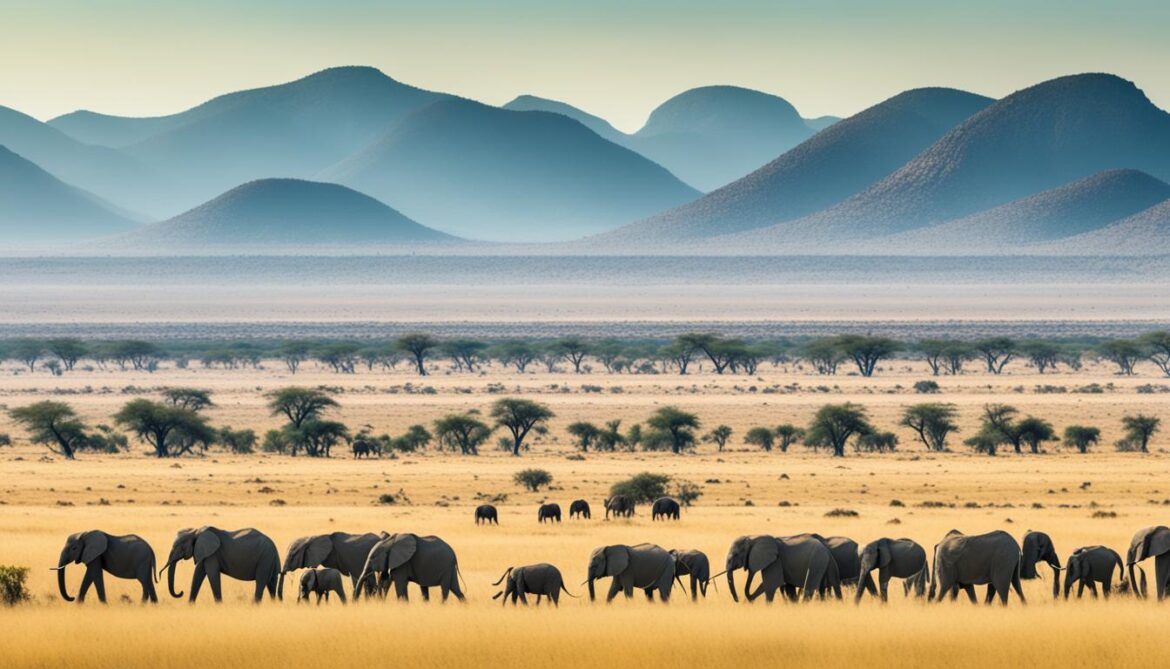
Threats to Botswana’s Biodiversity
Despite its remarkable biodiversity, Botswana’s flora and fauna face numerous threats. Habitat reduction and destruction, caused by human activities like agriculture, urbanization, and mining, disrupt ecosystems and displace many species. Climate change, characterized by rising temperatures and changing rainfall patterns, poses challenges to both plant and animal species, leading to habitat loss and altered migration patterns. Poaching, particularly of iconic species like elephants and rhinos, remains a critical issue. Unregulated tourism, while an important source of revenue, can also contribute to habitat disturbance and disrupt wildlife behavior patterns. The extensive impact of these threats emphasizes the urgent need for increased conservation efforts and sustainable practices in Botswana.
Conservation Efforts in Botswana
Botswana is committed to protecting its rich biodiversity through a range of conservation efforts. These initiatives aim to mitigate threats and ensure the long-term survival of the country’s diverse species. Here are some key conservation initiatives in Botswana:
National Biodiversity Strategy Action Plan
The National Biodiversity Strategy Action Plan provides a comprehensive framework for conservation actions in Botswana. This strategic plan outlines the goals and objectives for preserving the country’s unique flora and fauna, and guides the implementation of conservation programs.
Environmental Legislation
Botswana has enacted comprehensive environmental legislation to safeguard its natural heritage. These laws regulate activities that may impact the environment and biodiversity, ensuring that they are carried out in a sustainable and responsible manner.
Anti-Poaching Campaigns
The government of Botswana has launched rigorous anti-poaching campaigns to combat the illegal wildlife trade. These campaigns aim to protect iconic species like elephants and rhinos from poachers, preserving their populations for future generations.
Collaboration with International Organizations
Botswana collaborates with international organizations and partners to enhance law enforcement and strengthen conservation efforts. Through these collaborations, the country benefits from the expertise, resources, and support of global conservation networks.
Community-Based Natural Resource Management
Community-based natural resource management programs actively involve local communities in conservation efforts. By empowering communities to manage and benefit from wildlife resources sustainably, these programs promote both wildlife conservation and the well-being of local residents.
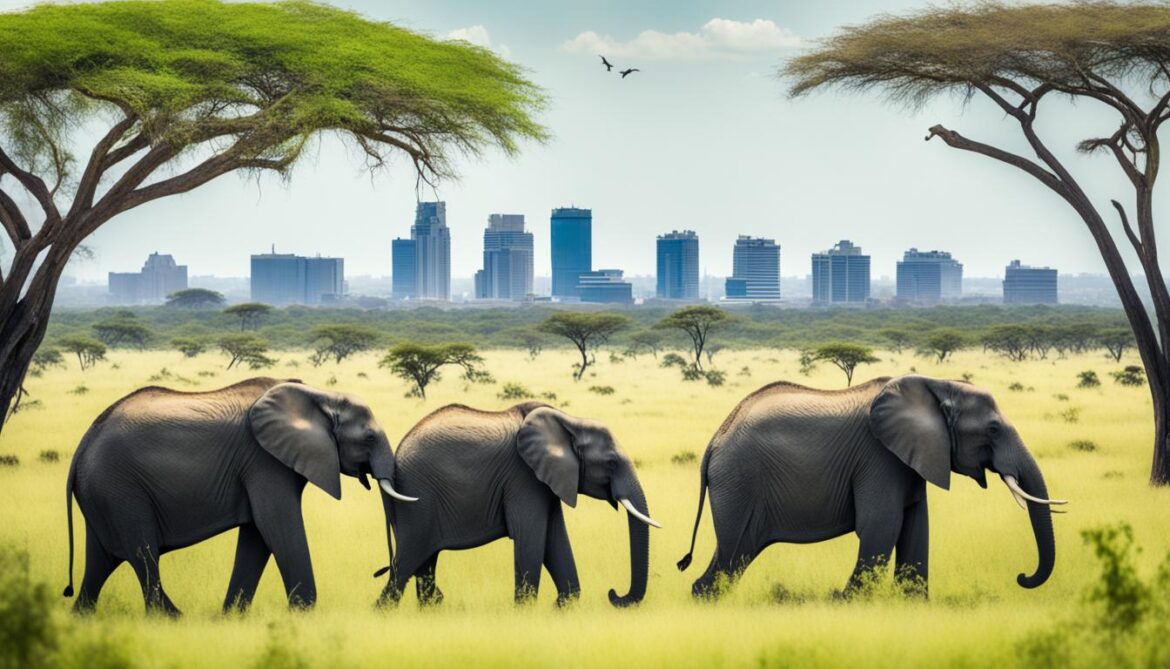
These conservation initiatives demonstrate Botswana’s commitment to preserving its natural heritage and ensuring a sustainable future. Through the National Biodiversity Strategy Action Plan, environmental legislation, anti-poaching campaigns, and community engagement, Botswana actively protects its diverse ecosystems and the invaluable species that call them home.
Importance of Sustainable Urban Development
Sustainable urban development plays a crucial role in harmonising Botswana’s biodiversity with the built environment. By implementing green building practices, such as energy-efficient designs, water conservation measures, and the use of sustainable materials, Botswana can minimise its environmental impact and promote the coexistence of urban areas and natural habitats. Sustainable urban planning also considers the protection and enhancement of green spaces, promoting biodiversity within cities. By prioritising sustainable architecture and urban development, Botswana can contribute to the protection of its wildlife and ecosystems while ensuring a high quality of life for its residents.
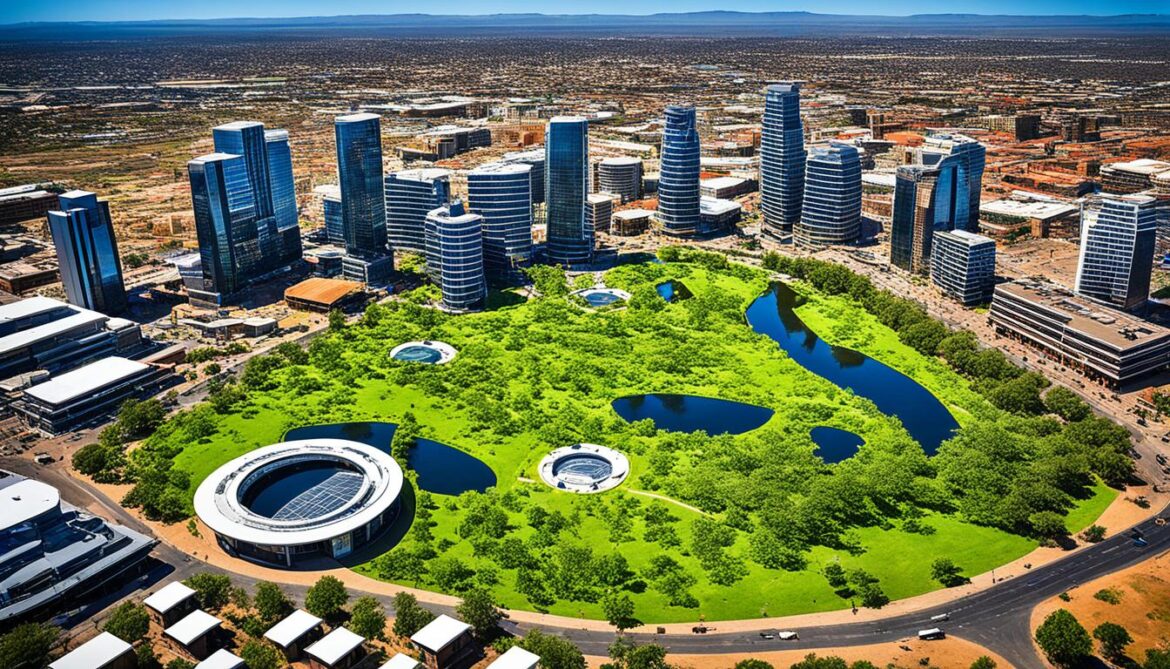
By creating environmentally friendly cities, Botswana can achieve a balance between urbanisation and the preservation of its natural heritage. Green building practices not only reduce resource consumption and waste production but also improve energy efficiency and indoor air quality. Incorporating renewable energy sources, such as solar panels and wind turbines, into urban infrastructure can further mitigate environmental impact and promote sustainable living.
In addition to energy-efficient designs, sustainable urban development includes water conservation measures. Capturing and reusing rainwater, implementing efficient irrigation systems, and promoting water-saving technologies in buildings can help alleviate water scarcity and ensure the long-term sustainability of water resources. By reducing water waste, Botswana can protect its ecosystems and ensure water availability for both human and animal populations.
Protecting and enhancing green spaces within cities is fundamental to promoting biodiversity and improving the overall quality of life. Urban parks, gardens, and green roofs provide habitats for plants and animals, create spaces for recreation and relaxation, and enhance the aesthetic appeal of urban areas. These green spaces also have health benefits, such as improving air quality, reducing heat islands, and mitigating the impacts of climate change.
In summary, sustainable urban development in Botswana is vital for preserving the country’s biodiversity and ensuring a sustainable future. By implementing green building practices, conserving water resources, and enhancing green spaces within cities, Botswana can foster a harmonious relationship between urbanisation and the natural environment. Adopting sustainable architecture and urban planning principles not only benefits the environment but also enhances the well-being of its residents. With a collective effort towards sustainable urban development, Botswana can contribute to the protection and conservation of its wildlife, ecosystems, and natural heritage.
Economic Benefits of Environmental Stewardship
Environmental stewardship and the conservation of biodiversity in Botswana contribute to the country’s economy in various ways. One key sector that has experienced significant growth is wildlife tourism. The diverse and stunning natural landscapes of Botswana, coupled with its abundant wildlife, make it an ideal destination for nature enthusiasts and adventure seekers alike.
Wildlife tourism in Botswana provides high-end safari experiences, allowing visitors to observe iconic African animals in their natural habitats. From thrilling game drives to serene boat safaris in the Okavango Delta, tourists have the opportunity to witness breathtaking wildlife spectacles and create lasting memories.
The economic impact of wildlife tourism cannot be understated. It has helped diversify Botswana’s economy, reducing its reliance on diamond mining and creating new revenue streams. Wildlife tourism contributes significantly to the country’s GDP, generating income through accommodation, transportation, tour services, and other related industries.
This flourishing industry also has a positive effect on local communities. It provides employment opportunities, both directly and indirectly, fostering economic growth and social development. Local guides, lodge staff, artisans, and entrepreneurs benefit from the industry’s demand for unique experiences and authentic cultural interactions.
“Botswana is a paradise for wildlife enthusiasts. The incredible diversity of habitats and the dedication to conservation create a thriving environment for unique experiences and encounters with nature.” – Sarah Thompson, Traveler
Furthermore, environmental stewardship and sustainable management of natural resources in Botswana have broader economic implications. The conservation of land and water resources ensures their availability for future generations, supporting other sectors such as agriculture and forestry. By preserving ecosystems and promoting responsible land use practices, Botswana can maintain a healthy environment that sustains livelihoods and fosters sustainable economic growth.
In conclusion, environmental stewardship and the conservation of biodiversity in Botswana not only protect its unique natural heritage but also contribute to its economic prosperity. The thriving wildlife tourism industry, along with sustainable resource management, provides economic opportunities for both local communities and the country as a whole. By nurturing and preserving its natural environment, Botswana sets an example of a sustainable development model that benefits both people and wildlife.
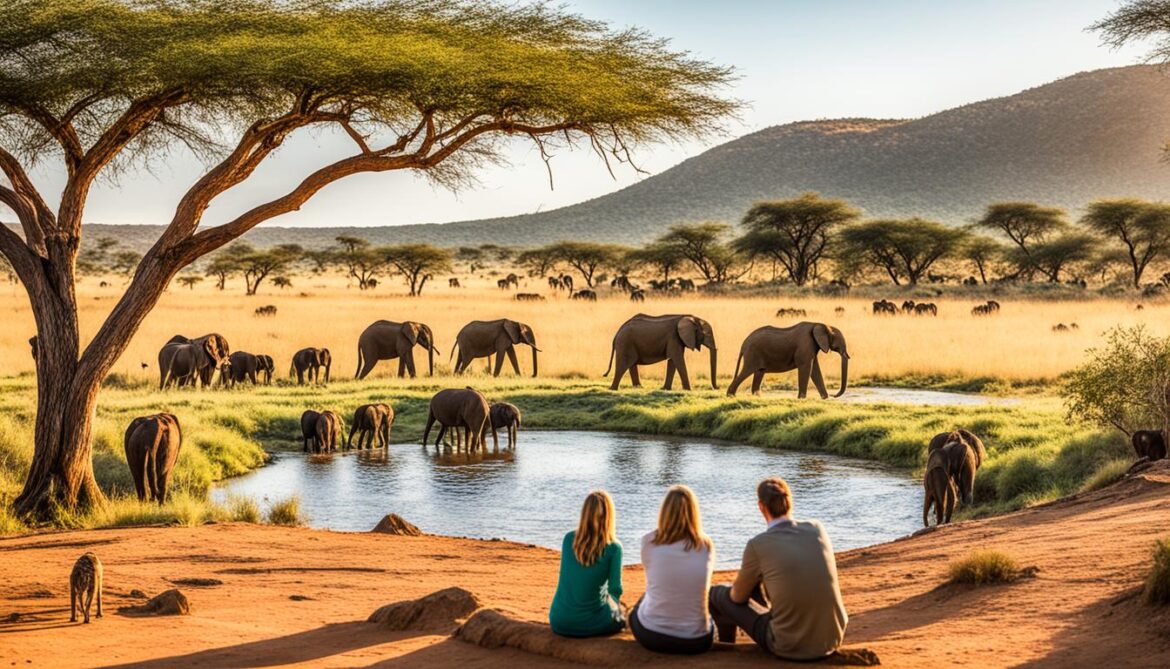
The Role of Education and Awareness
Education and awareness play a crucial role in ensuring the long-term conservation of Botswana’s biodiversity. By raising public awareness about the importance of biodiversity and its role in sustainable development, citizens are more likely to actively participate in conservation efforts and make informed decisions that promote environmental stewardship.
Education programs, workshops, and public campaigns can provide valuable information about biodiversity conservation, the benefits of protecting natural habitats, and the sustainable use of resources. These initiatives help individuals understand the interconnectedness of ecosystems and the impact of their actions on the environment.
“The greatest threat to our planet is the belief that someone else will save it.” – Robert Swan
By fostering a sense of responsibility and understanding among the population, Botswana can cultivate a culture of environmental stewardship and secure the future of its diverse species. When individuals are equipped with knowledge about the importance of biodiversity, they are more likely to take actions that contribute to its preservation.
Furthermore, public participation in conservation initiatives and decision-making processes is crucial for successful biodiversity management. By involving the public in discussions, consultations, and collaborative efforts, Botswana can ensure that diverse perspectives are considered and that conservation measures reflect the needs and aspirations of the local communities.
Overall, education and awareness-building efforts are fundamental for creating a society that values and actively protects Botswana’s rich biodiversity. With greater knowledge and engagement, each individual becomes a steward of their environment and contributes to the sustainability and resilience of Botswana’s ecosystems.
Conclusion
In conclusion, Botswana’s rich biodiversity and unique ecosystems emphasize the critical importance of conservation efforts and sustainable practices. With its diverse flora and fauna and the establishment of numerous protected areas, Botswana serves as a crucial refuge for endangered species and offers unparalleled opportunities for wildlife tourism. However, persistent threats such as habitat reduction, climate change, poaching, and unregulated tourism demand immediate attention and action.
Through the implementation of the National Biodiversity Strategy Action Plan, comprehensive environmental legislation, and collaborative initiatives, Botswana is actively working towards achieving a harmonious coexistence between its built environment and its valuable biodiversity. By prioritizing sustainable urban development, harnessing the economic benefits of environmental stewardship, promoting education and awareness, Botswana is paving the way for a sustainable future.
By nurturing sustainable practices, Botswana can protect its diverse species and preserve its natural heritage for generations to come. It is through these collective efforts that Botswana can ensure the longevity of its biodiversity and foster a sustainable future that benefits both its people and its precious ecosystems.
FAQ
What is the significance of Botswana’s biodiversity?
Botswana’s biodiversity is of great importance as it hosts diverse ecosystems, unique plant and animal species, and contributes to the country’s economy through wildlife tourism.
What are some notable flora and fauna species found in Botswana?
Botswana is home to resilient plants such as the camel thorn tree and mopane tree, as well as iconic African animals including lions, elephants, and giraffes.
How does Botswana protect its wildlife and ecosystems?
Botswana has established numerous protected areas like the Okavango Delta and Chobe National Park, and implemented initiatives such as anti-poaching campaigns and community-based natural resource management programs.
Which areas in Botswana are considered biodiversity hotspots?
The Okavango Delta and the Central Kalahari Game Reserve are notable biodiversity hotspots in Botswana, supporting diverse plant and animal species.
What are the main threats to biodiversity in Botswana?
The main threats to Botswana’s biodiversity include habitat reduction and destruction, climate change, poaching, and unregulated tourism.
What conservation efforts are in place in Botswana?
Botswana has implemented the National Biodiversity Strategy Action Plan, environmental legislation, and various conservation initiatives, such as anti-poaching campaigns, to protect its biodiversity.
How does sustainable urban development contribute to biodiversity conservation in Botswana?
Sustainable urban development practices, such as green building and the preservation of green spaces, help minimize the impact of urban areas on natural habitats and promote the coexistence of wildlife and human populations.
What economic benefits does Botswana gain from environmental stewardship?
Botswana’s wildlife tourism industry provides a significant contribution to the country’s GDP and creates employment opportunities. Additionally, sustainable management of natural resources supports other sectors of the economy, such as agriculture and forestry.
What is the role of education and awareness in biodiversity conservation?
Education and awareness play a crucial role in fostering a sense of responsibility and understanding among the population, encouraging active participation in conservation efforts and promoting environmental stewardship.
What is the overall importance of conserving Botswana’s biodiversity?
Conservation efforts in Botswana are essential to preserve the country’s diverse species, protect its ecosystems, maintain economic benefits from wildlife tourism, and ensure a sustainable future for generations to come.



